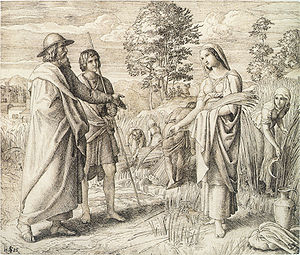
God has blessed both my daughters with godly young men to spend their lives with – and I love them both. However, before Jeremy and Justin came along, there were times I wanted to play matchmaker. Times when I thought Kelley or Sarah needed my help in finding the right husband! As always, God knew which men He had prepared for my two girls all along.
Every mother longs for their daughter to be well-cared for, protected, and loved. Naomi was no different. Although Ruth was technically Naomi’s daughter-in-law, Naomi considered her a daughter. In Ruth chapter 3, Naomi assumes a responsibility for Ruth that parents in that culture had concerning their daughters – securing her future by finding a good husband.
In Ruth 3:1, Naomi states her intention of finding a “place of rest” for Ruth.
The Hebrew word manowach, which is translated as “home” in the NIV, means “a place to settle down; a home.” For Jewish women, a “place of rest” specifically referred to the security they wanted to find with a loving husband. Naomi had one lofty purpose in sending Ruth on this nighttime mission – long-time provision for her daughter through marriage to a kinsman redeemer, an honorable man named “Boaz.” (For more about the role of the kinsman redeemer, check out yesterday’s post by Sandra.)
Naomi told Ruth to bathe, put on perfume, and dress. Then Naomi gave her specific instructions on how to approach Boaz and what to do, including “uncovering his feet and lying down” after he had gone to sleep near his pile of grain. There are some variations among biblical scholars on exactly how to understand the events that night. Unfamiliar customs of an ancient culture fill this secretive meeting.
The third chapter of Ruth is one of those Bible passages we must deal with carefully. Context and purpose are vital to understanding exactly what transpired on the threshing floor. (If you have time, read Ruth 3:1-18 now to get the story.) The following information and facts will guide us in coming to a conclusion about this encounter:
- The character of those involved – Naomi, Ruth, and Boaz were all honorable people who feared Jehovah.
- Intent – Naomi’s intentions were also honorable and long-term. A one-time, sexual encounter would not meet Ruth’s need.
- Ruth’s dress – The word “dress” in 3:3 is simla. It normally refers to an outer garment that covered everything but the head. Poor people, like Ruth, also used this garment for a blanket, making this appropriate preparation for spending a cool night outside. Definitely not the dress of a woman with plans for seduction.
- “Uncovering his feet” – this phrase has been used of seductive behavior, but not in all cases. Given the context and Naomi’s intentions, it seems more likely that Naomi’s plan was simply to gently wake Boaz when the temperature dropped in the night.
- Ruth’s request – “Spread the corner of your garment over me,” was a Hebrew euphemistic idiom for marriage. The Hebrew literally translates “to spread one’s wing over.” (See Ruth 2:12.) Ruth asked Boaz to take her under his care, assume responsibility for her, and provide for her.
- Boaz’ response – Boaz’ reaction speaks volumes. He obviously understood Ruth’s words and actions as a request for marriage. In fact, he considered her request a “kindness” and promised to act on it immediately.
Naomi sent Ruth on a dramatic and risky adventure. But as they say: drastic times call for drastic measures. Ruth was a poor, foreign widow in Israel. Without a husband to care for her, her future was bleak. Naomi lovingly longed to secure provision for her “daughter.” Boaz had not made any moves in that direction – possibly because Ruth had been in mourning. But now Ruth’s mourning was completed and Naomi did not want to waste any more time. Boaz needed to know that Ruth was available and willing to marry him.
Naomi selflessly focused on Ruth’s needs and took action. Who needs your action on their behalf today?













